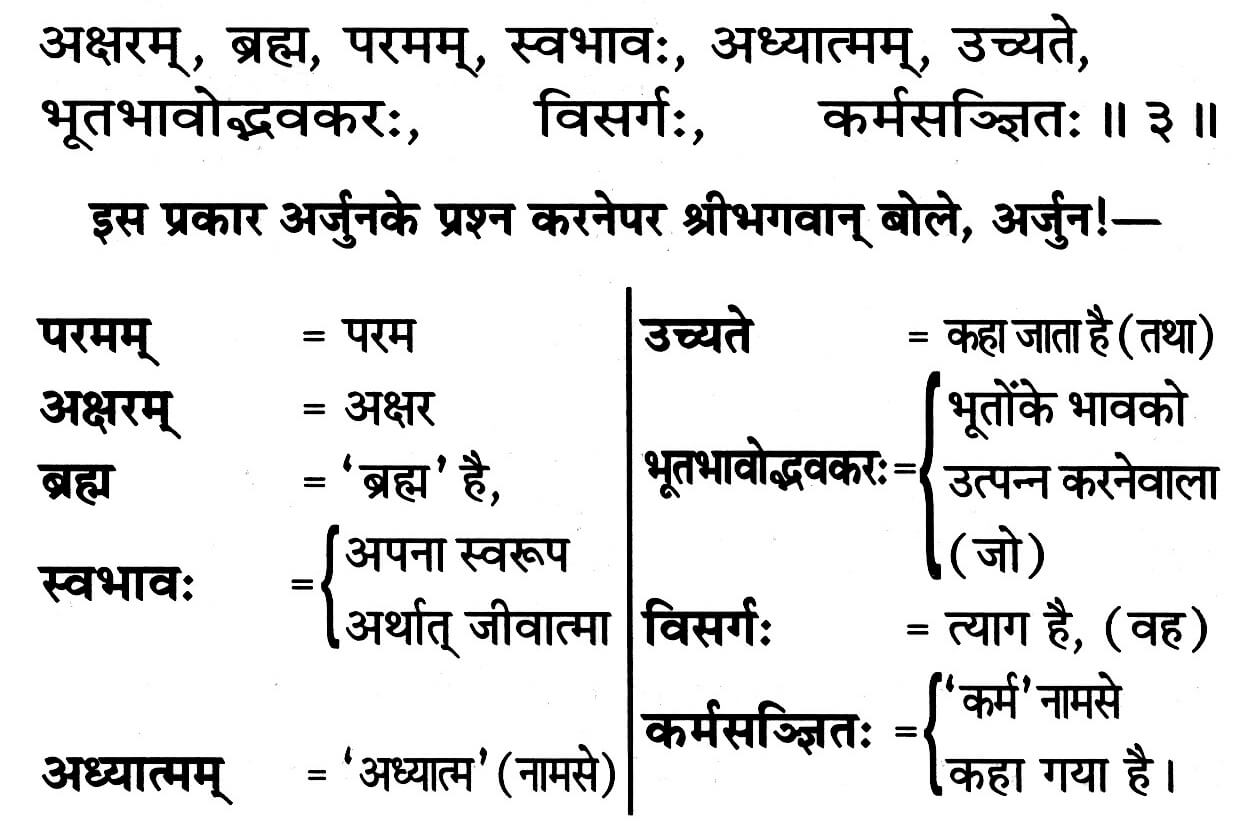Gita 8.3
अक्षरम्, ब्रह्म, परमम्, स्वभावः, अध्यात्मम्, उच्यते,
भूतभावोद्भवकरः, विसर्गः, कर्मसञ्ज्ञित:।। 3।।
Gita 8.3
(Shri Bhagwan uvaach)
Aksharam’, Brahm, Parmm’, swabhaavH, adhyaatmm’, uchyate,
Bhootbhaavod’bhavkarH, visargH, karmsangyitH ||3||
(Shri God said)
Translation: God Brahm replied, He (Parmm’) Param (Aksharam’) Akshar (Brahm) ‘Brahm’, who always lives with the soul (swabhaavH) His own form i.e. a soul with the characteristics of God (Adhyaatmm’) by the name ‘Adhyaatm’ (uchyate) is called and (bhootbhaavod’bhavkarH) which gives rise to the nature of jeev / soul / living being (visargH) sacrifice (karmsangyitH) is called by the name ‘Karm’. (3)
Gita 8.3: God Brahm, the giver of the knowledge of Gita has replied – He is 'Param Akshar Brahm' (Supreme God), who always lives with the soul; His own form i.e. a soul with the characteristics of God is called by the name ‘Adhyaatm’, and the sacrifice which gives rise to the nature of a jeev / soul / living being is called by the name ‘Karm’.
Bhagavad Gita Chapter 8 Verse 3 - Purport
The speaker of Gita in 7.29 mentioned about "Tat Brahm" (some other God) to Arjun, on hearing which Arjun became perplexed. To gain further clarification about this "Other God" Arjun posed a question to Shri Krishan in Gita 8.1 asking about this Tat Brahm (Arjun said 'Kim Tat Brahm'). To answer this question Shri Krishan replied in Gita 8.3, that he is Param Akshar Brahm (the Supreme God).
Gita 8.3 further elaborates the meaning of 7.29 by saying that those who seek the refuge of Supreme God (Param Akshar Brahm) strive to get rid of birth and death because they have understood that by worship of Brahm (speaker of Bhagavad Gita) birth and death does not end. To further support this, Brahm in Gita 18.62 clearly tells Arjun to go into the refuge of some other God to attain supreme peace and everlasting place. This is the core message of Bhagavad Gita, i.e. go into the shelter of Supreme God to get rid of cycle of birth and death and attain the eternal place called Satlok (Shasvat Sthan)
Bhagavad Gita Chapter 8 Verse 3

← Bhagavad Gita Chapter 8 Verse 2 Bhagavad Gita Chapter 8 Verse 4 →